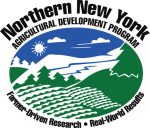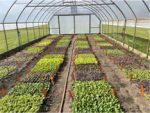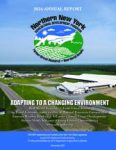
Northern New York; July 2, 2025. The latest results of local foods research funded by the farmer-driven Northern New York Agricultural Development Program (NNYADP) provide growers with data and insight into the production and economic factors that influence the opportunity to profitably produce cantaloupe in a high tunnel environment.
Increasing consumer interest in local foods availability and the proliferation of high tunnels – heated and unheated – across northern New York combine to generate local produce sales earlier in the year and extend income opportunities through year-end.
In 2023-2024, Cornell University Regional Vegetable Specialist Elisabeth Hodgdon, Ph.D., and Regional Agriculture Business Specialist Lindsey Pashow conducted production trials of three different growing systems with two different varieties of cantaloupe melons. They additionally developed economic budgets for each variety, each system, and each year. The complete project report is posted at nnyagdev.org.
“In both years, each melon production system in the trials: untrellised, vertical mesh, and double leader resulted in a net profit; however, growers need to carefully consider factors such as the labor and expenses of each type of growing system,” said Hodgdon.
Enterprise budgets were extrapolated for full production load in a 30x 96-foot high tunnel. Net income by variety in the 2024 trials ranged from $1,451.78 for the mesh-grown Tasty Bites (200 plants per tunnel) to $3,473.78 for the mesh grown Sugar Cube (200 plants per tunnel).
The two-year average net income ranged from $1,690.11 for the mesh-grown Tasty Bites (200 plants per tunnel) to $2,624.67 for the untrellised Sugar Cube (160 plants per tunnel).
“We often compare the net income opportunities of the crops we trial for high tunnel production with that for consumer-popular and profitable high tunnel-grown tomatoes. A skilled high tunnel tomato grower with strong markets and pricing may prefer to continue with that crop; however, if a grower has multiple tunnels, an interest in diversifying crop offerings, and local marketing potential for melons, melons may be a profitable option,” Pashow commented.
The enterprise budget calculations include fixed costs for land and equipment and 30 variable costs that include labor, crop preparation, fertilizer, beneficial insects, materials and other factors.
In 2024 the highest yielding system was the untrellised “Sugar Cube” variety producing 13.3 lbs. of marketable fruit per plant versus 9.63 lbs. per plant for untrellised “Tasty Bites” as the highest yielding system in 2023.
The total number of marketable melons per plant ranged from 4 to 6, with the mesh-trellised and untrellised treatments of the “Sugar Cube” variety producing six melons on average per plant.
NNYADP high tunnel production research to help market growers overcome the challenges of northern New York’s short growing season and weather extremes has evaluated more than a dozen crops, including tomatoes, miniature cabbages, sprouting broccoli, winter season greens, summer lettuce, fall-bearing berry crops, cut flowers, and crops not traditionally grown in high tunnels at the time, including seedless cucumbers, fresh ginger, turmeric, basil, zucchini, and green beans.
NNYADP year-to-year research results are posted under the Horticulture/Local Foods tab at nnyagdev.org.
 Funding for the Northern New York Agricultural Development Program is supported by the New York State Legislature through the New York State Assembly and administrated by the New York State Department of Agriculture and Markets.
Funding for the Northern New York Agricultural Development Program is supported by the New York State Legislature through the New York State Assembly and administrated by the New York State Department of Agriculture and Markets.
 “Having grown up on my family’s dairy farm, I understand the challenges our farms face on a daily basis,” said Assemblyman Billy Jones. “This is why I’m proud to stand up for farmers and secure funding in the budget every year to help continue the great work being done through the Northern New York Agricultural Development Program. Agriculture is a big part of the fabric that makes up the North Country, and these NNYADP grants will help bring the industry in our region to the next level.”
“Having grown up on my family’s dairy farm, I understand the challenges our farms face on a daily basis,” said Assemblyman Billy Jones. “This is why I’m proud to stand up for farmers and secure funding in the budget every year to help continue the great work being done through the Northern New York Agricultural Development Program. Agriculture is a big part of the fabric that makes up the North Country, and these NNYADP grants will help bring the industry in our region to the next level.”

 NNYADP projects have a proven record of providing data and insight that help farmers adapt to the challenges of northern New York’s weather extremes and emerging pests as well as to the agricultural industry’s environmental stewardship and farm income goals. NNYADP project results are posted at nnyagdev.org.
NNYADP projects have a proven record of providing data and insight that help farmers adapt to the challenges of northern New York’s weather extremes and emerging pests as well as to the agricultural industry’s environmental stewardship and farm income goals. NNYADP project results are posted at nnyagdev.org. Evaluating the impact of the forages from each trial location on the resulting dairy cow diets and milk production offered insight into how the growing environment affects the use of and value of the crops as feed ingredients in the dairy diet. The diets were 64.6 percent and 52.8 percent forage content for the western NNY and eastern NNY field sites, respectively.
Evaluating the impact of the forages from each trial location on the resulting dairy cow diets and milk production offered insight into how the growing environment affects the use of and value of the crops as feed ingredients in the dairy diet. The diets were 64.6 percent and 52.8 percent forage content for the western NNY and eastern NNY field sites, respectively.